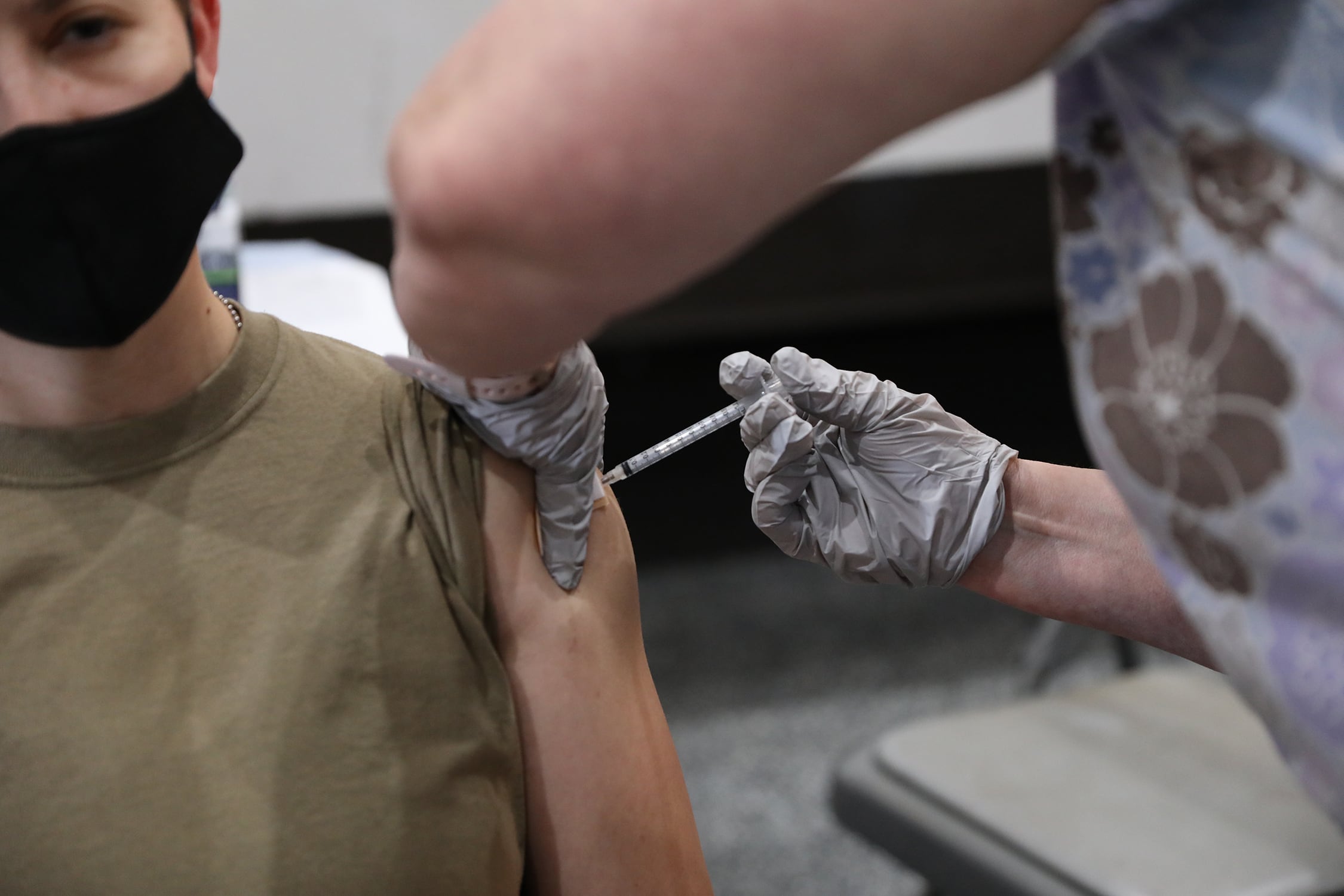Correction: An earlier version of this article outlined enforcement actions, including suspension of pay, that could be applied to unvaccinated personnel. These actions are only applicable to civilian employees, and not soldiers.
Unvaccinated troops will be limited to mission critical travel and will have to submit a negative COVID-19 test at least weekly before entering military facilities, according to two fragmentary orders issued Nov. 21 and reviewed by Army Times.
The FRAGOs also outlined the appeals process for troops who are denied religious waivers and described how commanders must purchase COVID-19 test kits for their soldiers.
The FRAGOs come on the heels of eleven service members dying of COVID-19 in October, according to Defense Department numbers released Nov. 3, making it the third month in a row where fatalities reached the double-digits.
Throughout 2020, and up until August 2021, generally only one or two troops died of COVID-19 complications each month, but as the Delta variant surged around the country, so did cases in the military. No COVID-19 related deaths have been reported among fully-vaccinated soldiers.
Effective Wednesday, according to the latest FRAGOs, senior mission commanders have to establish COVID-19 screening programs for unvaccinated soldiers and civilian employees who access DoD facilities.
Testing for unvaccinated personnel will be performed at least weekly for troops who enter DoD facilities on a regular basis, one FRAGO stated. For personnel who access DoD facilities on a less routine schedule, a negative test must be submitted not greater than 72 hours prior to arrival, the FRAGO added.
Commanders cannot procure COVID-19 test kits from medical treatment facilities and must purchase the test kits using unit operating funds through the Army’s Global Combat Support System. The three kits authorized are the QuickVue At-Home test, the Orasure InteliSwab test and the Abbott BinaxNOW test. Each test has a turnaround time of mere minutes.
Travel is also going to be more difficult for unvaccinated soldiers, according to the FRAGOs.
Travel for mission critical unvaccinated soldiers will require approval from the under secretary of the Army. Requests need to be submitted 21 days prior to travel. A decision memorandum through the vice director of Army staff and the endorsement of the senior mission commander must be included in requests to travel.
Examples of mission critical travel include military deployments, high-level international negotiations that cannot occur remotely and COVID-19 response deployments.

Any travel that is approved for unvaccinated soldiers will require them to provide a negative COVID-19 test result within 72 hours of departure.
Soldiers undergoing a permanent change of station move while pending a vaccination exemption will also now need to submit an exemption to policy to the under secretary. Their current unit must notify the soldier’s new unit of the their situation. However, soldiers who are vaccinated or who have successfully received an exemption will not need an exemption prior to their PCS.
The Army has also authorized the creation of subject matter expert teams to review medical and religious exemption requests in an effort to “ensure consistency in the review process and decision of vaccine mandate exemption requests,” the FRAGOs read. These teams will include medical and legal experts, members of the chaplain corps, human resources personnel and other administrative employees.
As for the appeals process itself, any soldier denied religious exemption by the surgeon general can now plea their case through an appeals packet sent to the assistant secretary of the Army for manpower and reserve affairs.
Active duty soldiers seeking an appeal must submit a written request with the denial memo attached through their immediate commander to the general court-martial convening authority within seven days of receiving their denied request. Reservists have 30 days to do the same.
All decisions made by the assistant secretary in the appeals process are final.
Unvaccinated civilian employees, but not soldiers, are also subject to progressive enforcement actions that include a five-day counseling and education period; a two-week suspension without pay; and removal from federal service for failing to follow a direct order. The enforcement actions are based on the Office of Personnel Management’s guidance.
The FRAGO also permits soldiers and civilian employees to “mix and match” booster shots if they want to receive a different type than the one they were originally inoculated with. However, booster shots have not been made mandatory.
Rachel is a Marine Corps veteran and a master's candidate at New York University's Business & Economic Reporting program.
Davis Winkie covers the Army for Military Times. He studied history at Vanderbilt and UNC-Chapel Hill, and served five years in the Army Guard. His investigations earned the Society of Professional Journalists' 2023 Sunshine Award and consecutive Military Reporters and Editors honors, among others. Davis was also a 2022 Livingston Awards finalist.




